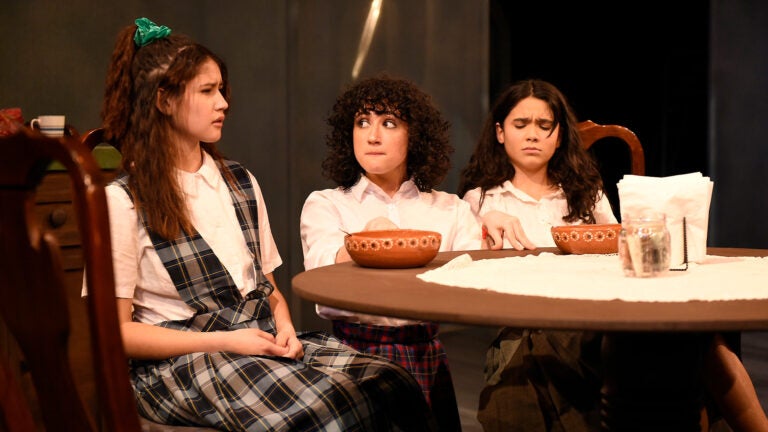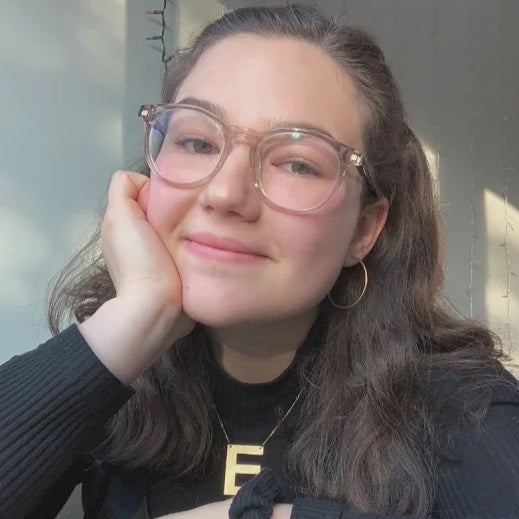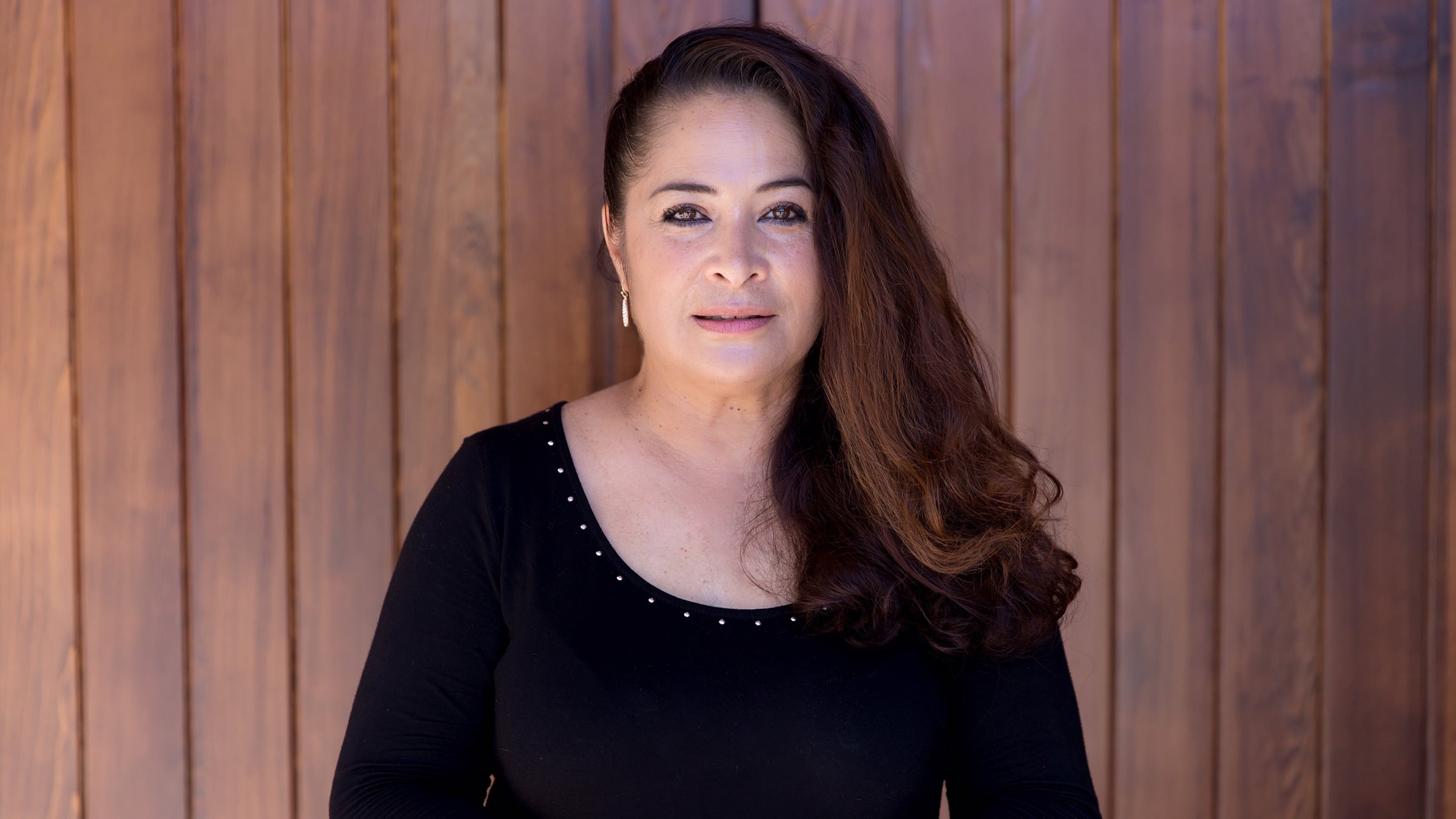
Cast members perform Cynthia Ochoa’s play Broken Shells. (Photo/Craig Schwartz)
USC playwrights draw inspiration from diverse backgrounds
The small cohort gets a fully immersive experience in the Los Angeles writing scene.
Eliza Kuperschmid and Cynthia Ochoa don’t have much in common on paper.
Kuperschmid, a 22-year-old New Jersey native, was a fresh graduate of a small college when she came to USC. Ochoa, a 55-year-old mother of three who emigrated from Mexico, received both her GED diploma and her undergraduate degree in her 40s before deciding to further her education.
Despite those different life journeys, both conquered their self-doubt to get into the Master of Fine Arts in Dramatic Writing program at the USC School of Dramatic Arts, one of the strongest writing programs in the country.

The program is among the university’s smallest and most selective, accepting only two students per year out of the roughly 100 who apply. It is so selective that both Kuperschmid and Ochoa did not think they’d make the cut.
“I actually had to email the admissions office to confirm that my acceptance was real,” Kuperschmid said with a laugh. “I didn’t think I’d even get into a school like USC, much less this specific program.”
Those feelings of doubt are a far cry from how the two Trojans feel now. The program has given them confidence, not only in their writing abilities, but also in their lives’ journeys.
“After this experience, I believe that it doesn’t really matter what your age is, your condition, where you’re coming from or your background,” Ochoa said. “If you believe in something, you can make it happen.”
USC dramatic writing: Accepting the best
The dramatic writing Master of Fine Arts is a three-year program that currently has eight total students. According to program director Luis Alfaro, what the cohort lacks in numbers, it makes up for in life experience.
“I always say that even though there’s only eight, it can feel like 80 just because they’re all so different,” Alfaro said. “We look for people who have an innate talent. We’re not as interested in where they are in their career, but if they show that instinct and skill for the craft.”
Alfaro said having a small cohort allows him to connect with each student on a closer level. The size of his classes allows for a more individualized setting than the standard lecture hall, as he’s able to spend more time with each student.
One of his classes, “Writing the Pacific Rim,” immerses students in local theater production, as well as Los Angeles history and the city’s art and food scenes.
“Through that they’ve started to discover what it means to write where you’re at,” Alfaro said.
“They start to understand Los Angeles as not just the place they go to school, but as a very integral place to the country.”
Velina Hasu Houston, Distinguished Professor of Theater in Dramatic Writing and resident playwright at the School of Dramatic Arts, also encourages students in the cohort to get inspired by everything L.A. has to offer. Houston, the founder of the graduate playwriting program at USC, said that what makes this group special is that even when L.A. is used as inspiration, each student’s life story gives them a distinct perspective, bringing a range of themes to the various plays.
“I find that they all come driven by this great passion to tell stories,” Houston said. “I don’t care if someone is from the South or the North or the Midwest. I don’t care what age they are, what race they are — if I feel that they have a talent, then I want to nurture and support that and inspire them to move forward.”
A fresh voice for the cohort
Kuperschmid admittedly doesn’t have the same years of writing experience as some of her peers, nor does she claim to be a typical “theater kid,” having never acted in school plays. She was an English and music double major at Skidmore College who happened to take a playwriting class for fun, which soon evolved into a passion for the craft.
“Playwriting is, for me at least, the freest medium,” she said. “You can really do and write about whatever you want in a play.”
She knew that to take her writing to the next level, she’d have to branch out of her comfort zone.
“I’ve lived in New Jersey all my life and I went to undergrad in upstate New York,” Kuperschmid said. “As much as I loved my undergrad experience and being from New Jersey, I really wanted to try something completely different because I thought it would push my writing to have some different experiences in life.”
Kuperschmid said USC’s interdisciplinary approach to learning also helped elevate her writing.
“I knew I could not only get better at my craft, but also learn new tools,” she said. “USC also has such a reputation for having a strong network, so as a young writer without personal connections to the theater or entertainment industry, I was really excited about the opportunity to make connections at USC to hopefully have a career in the future.”
The long road to USC dramatic writing program
For Ochoa, it was not just USC that seemed like a longshot, but higher education in general. Ochoa was born in Guadalajara, Mexico, though her mother moved her and her sisters around often due to her work. As a single mother, the elder Ochoa pulled Cynthia out of school at only 16 years old to help support the family.

Despite not finishing high school, Ochoa said she’s always been creative, with a passion for writing and storytelling. She eventually married, had children and immigrated to California in 2000. At age 40, with the encouragement of her husband, Ochoa decided to earn her GED certificate. With one educational goal checked off, Ochoa continued her studies by taking classes at Southwestern College in Chula Vista, Calif., before transferring to the University of California, San Diego. Despite earning a scholarship to UCSD, Ochoa said she still felt impostor syndrome and even some embarrassment about her age on campus.
“I used to walk around campus wearing a lot of caps because I didn’t want people to look at my face and see that I was older,” Ochoa said. “I felt like I didn’t fit in at all, but my desire to complete my education was so strong that I just kept going.”
Ochoa graduated from UCSD with a 3.94 GPA. When she decided to pursue a master’s degree, one of her professors suggested USC, where she has found support from both her cohort and faculty. Three years later, she’s on the verge of graduating with a Master of Fine Arts degree from USC with one of her plays, Matriarch, named as a semifinalist at the Bay Area Playwrights Festival. She also presented her thesis, Broken Shells, at USC’s New Works Festival in early March of this year.
“Even though I didn’t believe in myself at first, I think I can finally stop and say, ‘You’re talented,’” Ochoa said.
The road ahead
While Kuperschmid and Ochoa hope to write professionally and have their work featured on stage, both Trojans believe that the skills learned in this program will help them in wherever their careers take them.
“The dream is obviously to see something I wrote performed on stage, but another dream — that I told my USC professors about during my interview — is to be a college professor for writing or playwriting, specifically,” Kuperschmid said. “It’s just exciting to know that there are way more possibilities than I originally thought.”
One certainty for both students is that their cohort and time at USC will always be dear to their hearts.
“My time here at USC has been everything,” Ochoa said. “Now that I’m getting to the finish line, I’m almost mourning that it’s ending because I feel like I belong here. I mean, I’m on campus right now and I don’t feel like I have to wear a cap, which says a lot.”
Featured Experts
Velina Hasu Houston
Expert in Dramatic writing (playwriting, screenwriting, other media), Poetry, Multiethnic/mixed heritage/interethnic studies, Multiethnic identity and interracial relationships, Asian American drama, Ethnic studies (especially Japanese or African American) and Cinema critical studies in ethnicity, race



